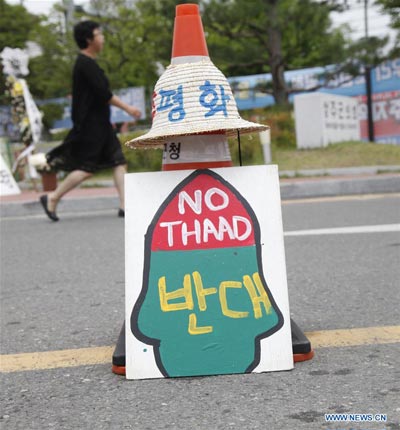


Deploying the Terminal High Altitude Area Defense (THAAD) in South Korea will pose a serious threat to China's strategic security, and China will by no means compromise such interests, read an editorial published in the People’s Daily on Wednesday.
The commentary, under the byline of Zhongsheng, comes as South Koreacommits to the plan despite public outcry.
The following is the translation of the article:
As tensions mount in the Korean peninsula, it is irreproachablethat South Korea wants to pursue a stronger sense of security. However, things will be different if its policy negatively affects the regional strategic balance and undermines the security interests of other countries.
South Korea must bear in mind thatstate-to-state relationshipsare by no means a game, especially when it comes to security issuesinvolvingcore national interests.
Experts expectsTHAAD to raise regional tensions rather than deter the DPRK's nuclear and missile threats, which the South Korean government cited as a main reason for the THAAD deployment on its territory.With the THAAD deployment, South Korea now enters the U.S. missile defense network, which would harm the geopolitical balance in the region and provoke strategic change from China and Russia.
A Russian newspaper pointed outthat the US is trying to excuse its long-term presence around China and Russia under the pretext of the North Korean nuclear issue.
Though South Korean decision-makers are fully aware of the hidden motives of the US, they are stiff-necked in binding its destiny with the THAAD despite public opposition.
But Seoul may not able to afford the domino effect brought by its decision, as the price will be regional stability and the security interests of its neighbors.
The Korean Peninsula issue may finally encounter a dead end and nobody will be able to guarantee absolute peace on the powder keg. Amid such severe circumstances, the policy makers of South Korea should double their prudenceto avoid the worst possibility.
The rushed and risky decision made by Seoul and Washington have crossed the security bottom line drawn by the South Korean public. A poll released on Monday showed thatpublic support for South Korean President Park Geun-hye has dropped. Some 60.7 percent view her governance negatively, and her support among those around 20 years old was below 10 percent.
At the same time, the South Korean public staged protests against the government's surrendering ofits national interests, and the opposition partyhas urged the government to rescind its decision on the THAAD deployment.
As a matter of fact, the US and South Korea once promised to negotiate with China on the deployment of the THAAD system, but later turned hostile and announced the rushed decision. However, their plans to strengthen defensive capabilities at the cost of other countries’ securitywould be a one-sided calculation.
During the 4thChina-Russia consultations on Northeast Asian security on July 28, diplomats of the two countries expressed serious concern over the THAAD deployment, agreeing to safeguard the interests of both countries in most reliable and effective ways. The two comprehensive strategic partners also agreed to highlight their strategic security interests.
Analysts stressed that deploying missile defense systems may fuel a dangerous arms race in Northeast Asia, as China and Russia would probably take counter-measuresthat the US and South Korea cannot afford.
According to the experts, the THAAD deployment will bring nothing good to Seoul, but trap the country in a military confrontation between the three powers. Once a conflict breaks out, South Korea will inevitably be the first target.
China is and will always be committed to building amicable partnerships with its neighbors, but such amicability must be based on a premise that other countries also take a peaceful development path like China.
As the THAAD deployment in South Korea will certainly impose a serious threat to China's strategic security, China will by no means stay indifferent and compromise its security interests.
No one can underestimate China's resolution and strength to safeguard its national security as it never fears external threats.
 Spectacular bridge with one of the tallest piers in the world
Spectacular bridge with one of the tallest piers in the world Magnificent view of Hukou Waterfall
Magnificent view of Hukou Waterfall A glimpse of Stride 2016 Zhurihe B military drill
A glimpse of Stride 2016 Zhurihe B military drill US Navy chief tours Liaoning aircraft carrier
US Navy chief tours Liaoning aircraft carrier Chinese American woman wins Miss Michigan
Chinese American woman wins Miss Michigan Centenarian couple takes first wedding photos
Centenarian couple takes first wedding photos Traditional Tibetan costumes presented during fashion show
Traditional Tibetan costumes presented during fashion show How did ancient people escape the summer heat
How did ancient people escape the summer heat Breathtaking scenery of Hulun Buir grassland
Breathtaking scenery of Hulun Buir grassland Top 10 livable Chinese cities
Top 10 livable Chinese cities Top 20 hottest women in the world in 2014
Top 20 hottest women in the world in 2014 Top 10 hardest languages to learn
Top 10 hardest languages to learn China’s Top 10 Unique Bridges, Highways and Roads
China’s Top 10 Unique Bridges, Highways and Roads Copyright or copy, right?
Copyright or copy, right? Why have US tech giants sunk in China?
Why have US tech giants sunk in China? Despite tech breakthroughs, regulatory hurdles prevent business from taking off
Despite tech breakthroughs, regulatory hurdles prevent business from taking off Experts worry religious extremism is infiltrating major Chinese cities
Experts worry religious extremism is infiltrating major Chinese citiesDay|Week